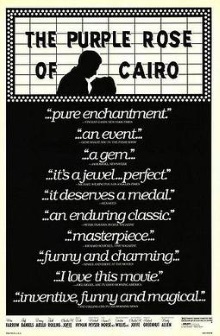
It’s been a while since we’ve watched a Woody Allen film and as the director is currently out of favor in Hollywood due to the #MeToo movement, his career may very well be over. I added this one to my list after I read about it as being among his best work and I note that it’s also notable as being one of those in which he does not himself appear in it.
It’s the Great Depression and Cecilia is a plain waitress who is harried at work and abused by a jobless husband. Her sole source of comfort in life is going to the movies which she does often and enthusiastically. Her latest film is The Purple Rose of Cairo about rich Manhattan socialites who travel to Egypt and return in the company of an archaeologist. She watches it several times after catching her husband cheating on her but she doesn’t have the courage to leave him. On the last viewing, the archaeologist Tom Baxter notices her and steps out of the screen into the real world. He accompanies her on a night on the town and declares that he has fallen in love with her. Meanwhile his escape causes chaos and distress first among the other characters still inside the film and later at the production studio. The actor Gil Shepherd who played Tom Baxter arrives in town to prevent the character from getting into mischief and ruining his reputation. He meets Cecilia and is moved by her devotion to cinema and her confidence that he will becomes a true star and soon also declares that he has fallen in love with her.
Fictional characters who enter the real world aren’t all that novel, but this film pulls it off with such a sense of wonder that is powerfully affecting. The simplicity of its plot belies the rich confluence of overlapping themes with the bleakness and misery of the Great Depression being the perfect setting to bring out the magic of Hollywood. At his best, Allen both glorifies and mocks his subject matter at the same time. He does so with Hollywood itself here, showing how it serves as a tonic to help forget for a time their daily troubles while still affirming that it is only a temporary and in a sense an artificial respite. Even the money that Tom Baxter carries into the real world is fake and Cecilia realizes that the champagne that they are supposedly serving in the Copacabana is only ginger ale. The real world Gil Shepherd isn’t much better and even if he is genuinely caught up in the passion of the moment, we see that it is soon forgotten in the face of more practical concerns. Most ironically we see how the studio heads and producers behind all of the Hollywood magic care only about making money.
I love how Mia Farrow here looks plain and somewhat dowdy even though both of her paramours keep saying how beautiful she is. The dirt and toil of Cecilia’s everyday life in New Jersey strikes a sharp contrast with the impossible to attain glamor of Fred Astaire and Ginger Rogers in Top Hat. It’s just a compact, flawless film all around and feels so very different from Allen’s usual work which is I suppose another reason why it is so notable. In some ways, it is reminiscent of the much later Midnight in Paris, another excellent film which coincidentally also does not star Allen himself.